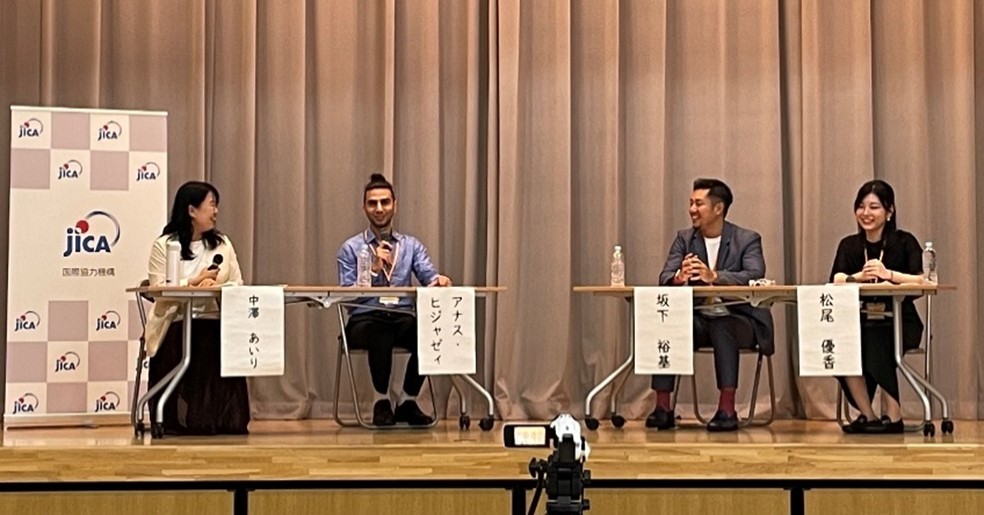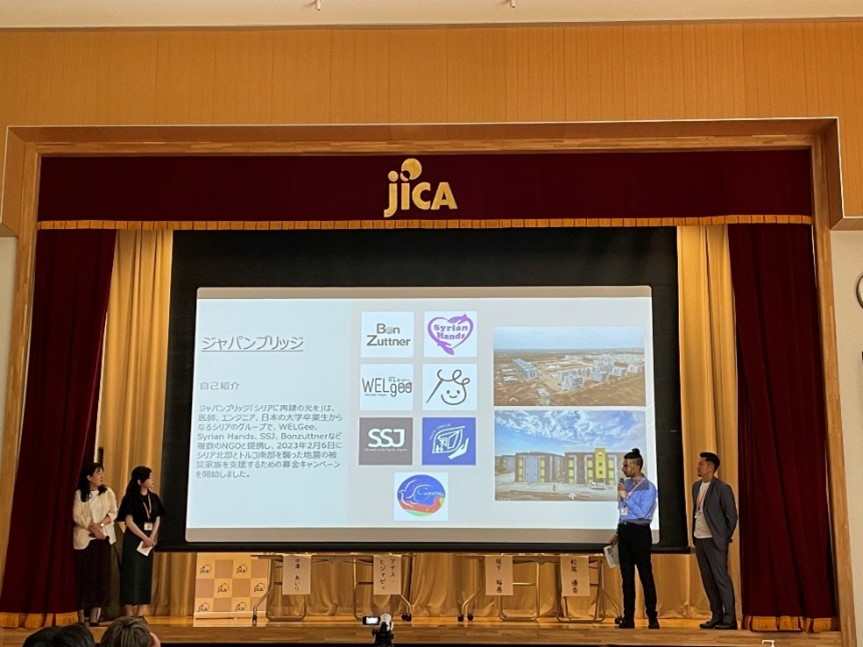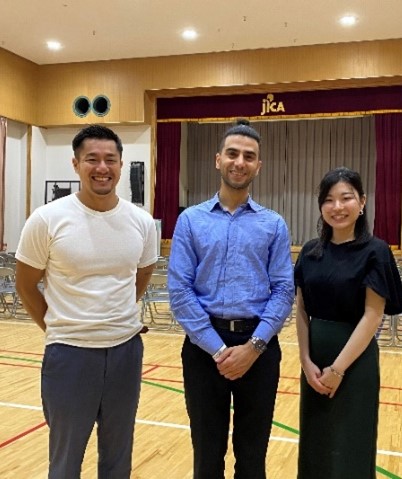JICA is implementing the "Japanese initiative for the future of Syrian refugees (JISR)" aimed toward human resource development, for Syrian refugees to contribute to the reconstruction of Syria in the future, and develop human resources as a bridge between Syria and Japan.
On the occasion of World Refugee Day on June 20, a talk titled "New Hopes and Dreams Discovered in Japan: As a Bridge between Japan and His Syrian Homeland" was held on Sunday, June 18, 2023.
This event featured Mr. Anas Hijazi, a JISR participant (third batch JISR program graduate,) who studied in Japan and went on to work in the private sector (Accenture Co., Ltd.), Mr. Yuki Sakashita, representative of BonZuttner Co., Ltd. who works together with one of JISR participants and other Syrian IT engineers, and Ms. Yuka Matsuo (LIFULL Co., Ltd.), who provides pro-bono [1] employment support for JISR participants and had also supported Mr. Anas's employment. These three speakers shared about their experiences at the event.
- [1]Pro-bono: A kind of volunteer activity which makes use of one's own professional skills and knowledge to serve a social or public benefit purpose.

Japan: A place I wanted to visit someday: the opportunity to study abroad (Mr. Anas)
Originally from Syria, Mr. Anas came to Japan in 2019. When the Syrian Civil War began in 2011, his hometown of Homs was attacked, resulting in his entire neighborhood collapsing. Owing to this, after graduating from university in 2012, he moved to Lebanon for work, while considering different ways to pursue his master's degree.
We asked Mr. Anas why he chose Japan, despite scholarship programs being available from Germany and the United States in addition to Japan. "I wanted to visit Japan someday," Mr. Anas said, before he narrated two incidents. First, his father would tell him, "If you want something good, buy products made in Japan." So, he always believed that Japanese products were of high quality but not expensive, as compared to those produced in other countries. Second, he was fascinated with anime and manga (he gave Slam Dunk and Naruto as examples) from Japan, and learned the language from a Japanese teacher at his university. He also got exposed to traditional Japanese culture, such as playing of the shakuhachi flute, calligraphy, and the tea ceremony. Hence, he already had a positive impression of Japan before coming here, and applied to the JISR program when his friend recommended it to him.
Links of Business: Recruitment and Activities of JISR Participants (Mr. Sakashita)
Mr. Yuki Sakashita, the CEO of BonZuttner, first began aiding refugees in 2015, after he saw a photograph that shocked the world. In this photograph, a boat traveling from Turkey to Greece getting capsized was captured, and the body of a Kurdish boy from Syria washed up on the beach could be seen. Subsequently, he started working with an NPO to support refugees, and is now actively working as manager of his own company. BonZuttner outsources the development of IT systems from companies in Japan to Syrian IT engineers to expand their work opportunities and fields of activity.
The current operating officer at BonZuttner has also completed JISR program in 2020. At the beginning of the project, the company recruited Syrian engineers from Syria and neighboring countries through Facebook and with the help of him. However, the JISR participant enthusiastically expressed his desire to be involved in this project, and after a few discussions, Mr. Sakashita decided to accept him first as an intern. He then successfully joined the company and eventually went on to become the operating officer. At present, he is dedicatedly learning the Japanese language, which he was previously weak at, and is keen on understanding Japanese business practices and training junior Syrian engineers. Mr. Sakashita was delighted to talk about the changes he sees in him every day.
Knowledge Gained from "Getting to Know Each Other": Experiences and Efforts of JISR Participants (Ms. Matsuo)
An employee of LIFULL, Ms. Yuka Matsuo said that although she was first exposed to the refugee issue in her university classes, even after she started working, she felt that "being a refugee" was something that happened to people in far-off countries. Then she learned about JISR's pro-bono activities from a company senior, and as someone who had always enjoyed supporting others, she decided to participate in these activities, since she felt that she could also contribute to the cause.
Ms. Matsuo and another team member were in charge of providing employment support for Mr. Anas. They met online once or twice in a week to ensure his progress, select the companies to apply for, and review the contents of their application documents. She found Mr. Anas to be very positive and humble, almost making her forget his background as a "refugee." In fact, her team was encouraged and energized by his proactivity. However, when they read the "Life-line chart" he wrote for his job search screening, they learned again about his experiences during the civil war and his traumatic experiences, and realized that his hard work has made him the kind of positive person that he is today.

The panel discussion
Until Japan becomes "Home" (Mr. Anas)
When war broke out in Syria, Mr. Anas had thought that "there was no hope left in the world." Even after he fled to Lebanon, he faced dicriminataion both in daily life and in social rules, and it was never a “home” where he could live peacefully.
In response to an audience question, "When did you feel at home in Japan?", he said, "First when I came here, I did not feel at home. But after about a year, I started to feel Japan as a home because the people here are kind and do not discriminate. I felt that they heard my story and respected me as an individual."
Mr. Anas said that his favorite place in Japan is Shodoshima Island in the Seto Inland Sea, which he visited with a Japanese friend. Among citrus fruits and olive groves, and surrounded by the sea, he told us with a nostalgic smile, that the scenery and the warmth of the islanders, who cheerfully start conversations while walking around, or offer plenty of food to eat, are very similar to people in his hometown in Syria.
However, it has not been all smooth sailing. A little after arriving in Japan, the COVID-19 pandemic broke out, which led everything, including university classes, to be conducted online. This made it very difficult to meet friends or make new ones. Furthermore, in addition to learning Japanese, there were days when it was difficult to balance studies and looking for jobs. Even so, recalling his working experience outside Japan, Mr. Anas was able to overcome these challenges by identifying his priorities, working on them in that order, while having a relieved moment talking with his friends.
After his continued efforts, he finally completed his studies and was offered jobs in five different companies. He chose to work at Accenture, which he believed would help expand his horizons and bring him closer to realizing his future goals. Mr. Anas has acquired solid Japanese language skills to the point where he can smoothly carry on a conversation on Japanese. When asked what new word he had recently learned, he said, hokatsutekina shakai, or inclusive society. This was met with admiration from the audience.
How can Japanese people support?
What can we Japanese people do to support someone like Mr. Anas, a refugee, or someone with a refugee background? Mr. Sakashita mentioned donations, volunteering, providing pro-bono services like Ms. Matsuo does, and attending similar events to better understand the issue.
Ms. Matsuo emphasized the importance of "knowing” and “getting to know each other.” "Knowing" is not just gathering information like you do from the news, such as that about the civil war, but also knowing about someone’s culture, language, food, etc. She said that actually "getting to know each other" provides a realistic perspective on the information that we see in the news or on a map. "Knowing and getting to know" makes these issues feel real and familiar, so that's the first important step that we can take. Ms. Matsuo experienced this first-hand through supporting JISR participants. When she got to know Mr. Anas and provided him with support, she experienced how her abstract conception and textbook understanding of refugees became a lived experience.
A Bridge between Syria and Japan: Mr. Anas' Dream for the Future
Finally, Mr. Anas spoke of his dreams for the future. His dream is to create a support group for refugees and people with refugee backgrounds in Japan. He said that the most important thing is to find people who are willing to take up issues of refugees and people with refugee backgrounds from various countries, and expressed that he would like to collaborate on this with companies, professionals, and agencies like JICA.
He also hopes to return to Syria in the future. When asked about his dream about Syria, he spoke in a powerful words as, "Japan faced worse devastation than Syria due to the explosion of the atomic bombs. Even so, Japan miraculously able to recover. Since then, no war has occured. Even if peace is restored in Syria, its economic problems will not be solved instantly, and there is a risk that war will recur. So, I want to share Japan's experience of post-war reconstruction and the idea of peace with Syrians, and contribute to their education and social development."
Mr. Anas has been actively sharing his experiences in different places through talks like this event. After the "Turkey-Syria Earthquake" that struck northern Syria in February 2023, he has been conducting fundraising activities with other JISR graduates, Syrians living in Japan, and Japanese collaborators to support affected Syrian people.
Mr. Anas has continuously worked hard: Studying, learning Japanese, hunting for jobs, working, and supporting various activities. When asked, "What keeps you going?" by the audience, he first and foremost spoke of the support he received from those around him and the expectations of his parents. Then, he added that talking about his experiences is not difficult, but fun and relaxing thing to do. He also said that he has a strong desire to make a difference worldwide, and believes that one cannot complain without doing something. He added that he is not alone, because his mother is always with him. Mr. Anas' mother passed away after he came to Japan, which was very difficult time for him, but he says that she is always with him, and that feeling of not being alone supports his daily work and activities.

Mr. Anas making a presentation for his support for the Turkey-Syria Earthquake
In Closing
The heartfelt stories from the speakers at this event created a warm and gentle atmosphere at the venue.
It was especially touching when Mr. Anas said “Since I am in Japan, we could move forward to work for world peace.” We are glad that his experience in Japan has been helpful in this way, and we hope he continues to play an active role as a bridge between the two countries.
Refugees and people with refugee backgrounds may still be a distant concept to many Japanese people, but we hope this event expands the circle of "knowing" and "getting to know," even if slightly.

Speakers at the Event (From the left: Mr. Sakashita, Mr. Anas, and Ms. Matsuo)




scroll